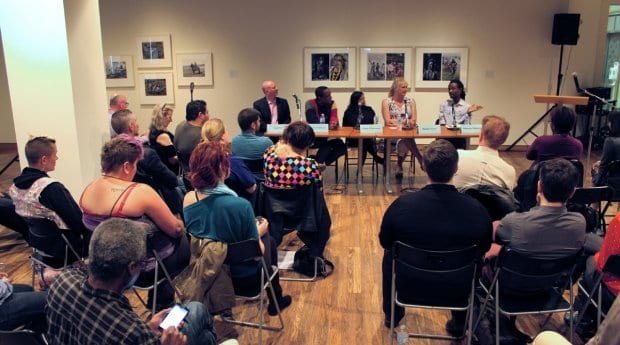The Dignity Initiative, an LGBT human rights working group, launched on May 14 with a panel discussion. The initiative aims to advance Canadian involvement in international LGBT human rights by connecting existing human rights organizations across the country.
Doug Kerr, project lead for the Dignity Initiative, tells Daily Xtra that the new working group plans to learn from the best practices of existing organizations from Canada and the world.
“We have some good examples of groups that are doing really good solidarity work,” Kerr says. “How do we learn from them? That’s the kind of thing we want to do; champion projects that are working.”
Speaking from the launch panel before an audience of about 40 activists and community members, Vijaya Chikermane, executive director of Toronto’s Alliance for South Asian AIDS Prevention, expressed the need for reflection on Canada’s role in international LGBT solidarity.
“We get so caught up in this want to do something that we don’t really step back and unpack what is it that we’re actually doing,” she said. “As a country we have a lot of power. We can mobilize people, we can mobilize money, we can influence. How we use that power is really important.”
The Dignity Initiative stems from last year’s WorldPride Human Rights Conference which brought together Canadian and international LGBT human rights advocates. Kerr stated that the conference raised questions about how Canadian advocates can most effectively support activists in the global South.
“It was a great event in the sense that we actually had a lot of people from around the world who came to Toronto and said, ‘There’s a role for Canada,’” Kerr explained of last year’s conference. “But you have to be careful, you have to be very thoughtful, you have to talk to groups around the world that you’re trying to support.”
Panelist Maurice Tomlinson, from the LGBTI Aware Caribbean and the Canadian HIV/AIDS Legal Network, concurred. “Canadians should appreciate that Canada has played a role in spreading homophobia in the Caribbean,” he stated. “When you’re engaging [in solidarity work], please engage as equals. Be willing to engage in meaningful dialogue – the global North has these issues as well.”
Michelle Emson, a documentary filmmaker and executive director of KyivPride Canada, lauded the progress made for LGBT rights in Canada in relation to current struggles in Ukraine.
“Yes, we still have some work to do here in Canada, but largely, let’s face it: it’s a party,” she told attendees. “We have a damn good time and we get to express ourselves.
Emson went on to describe the 2013 KyivPride march. “Just under 100 people were protected by around 1,500 police to march 300 metres in the centre of Kyiv. A public demand for LGBT universal human rights is just barely, barely possible in Ukraine right now.”
In addition to building on existing Canadian efforts, the Dignity Initiative is developing a non-partisan policy document that will outline recommendations as to how the Canadian government can advance LGBT human rights globally.
“What we’re hoping is we can develop a set of principles and a plan that any government after the October election would adopt,” Kerr said. “This is an election year and it’s an opportunity to inform policy.”
The current Canadian government has made itself infamous over its obstruction of Bill C-279, the trans rights bill. But Tomlinson expressed optimism over possibly working with a Conservative government.
“I don’t take it for granted that because they are Conservative they won’t buy into what [we have] to say. You have to find the right motivation for them. As the Dignity Initiative goes about its work, we have to prepare for all eventualities.”
Kerr says that the Dignity Initiative is in its early stages of development and has not yet established a strategy for engaging a Conservative government.
Emson expanded on the relation between Canadian and global struggles. “We’re still a work in progress, and especially for trans rights,” she tells Daily Xtra. “At the same time, it’s a great opportunity to open that dialogue up and say, well this isn’t just about us, there’s a bigger picture here.”
“It’s the right time in terms of Canada supporting that global solidarity more and more,” added panelist Adepapo Fabunmi, from Africans in Partnership Against AIDS and the Initiative for Equal Rights Nigeria.
Concluding the panel discussion, Kerr told attendees that much work remains to be done.
“The Dignity Initiative is just having conversations with people around the country right now,” he said. “How do we be more proactive rather than reactive? When the next Sochi debacle happens, or when the next set of anti-gay laws happens in some country, what are the ways that Canadians and government can have an informed, thoughtful response?”
The Dignity Initiative is soliciting public input to inform its future development. The Initiative yesterday released a survey for Canadian LBGT and human rights organizations. The survey is available at www.dignityinitiative.ca, where fields for public suggestions are also available.

 Why you can trust Xtra
Why you can trust Xtra


